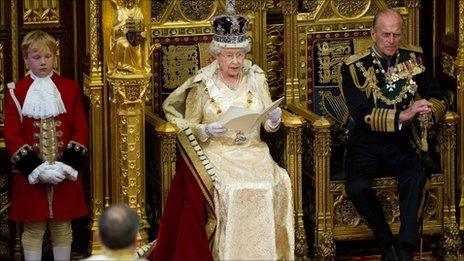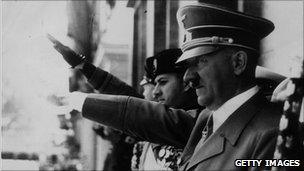In defence of Kings and Queens: why the monarch matters
- Published

Is the monarch a key component of the democratic system?
The influential political thinker Phillip Blond created the concept of the "red Tory", external. He argues that the monarch has an important, continuing and foundational role in contemporary British politics.
When we think of the monarchy we almost immediately think of something anachronistic, something over. Something belonging solely in history, at best charming but really faintly ridiculous, clearly kitsch and only for the tourists.
Modern progressives will smile indulgently at monarchist sensibilities.
They will talk about how our new democratic constitutions have finally and thankfully dispensed with such undemocratic and unrepresentative notions, and that kingship is now purely ceremonial.
But a moment's reflection will show that monarchy is not past or indeed passing. After all do we not still have kings - even if we call them something else?
A king is a person vested with ruling and sovereign authority over land and people. He is a single personage with the right to rule over the nation.
By that account a president or prime minister is a monarch who differs only in the principle of selection that confers upon him or her that particular role. In spite of much protestation we are (thankfully) nowhere ruled by the mass.
The people never choose to rule. Instead they always choose someone to rule over them. We have not replaced monarchy with democracy, but hereditary monarchs with elected ones.
The lesson then - however plural the means of selection might be - is that someone always rules.
There is a difference though between the power expressed by the monarch and that held by the prime minister. Initially we might think that the prime minister represents the democratic process. That he or she is a check on the absolute and arbitrary claims of the king.
But in reality the reverse is the case.
Paradox
Does not the ideal monarch stand for a higher good and a deeper principle than that of the politician? Indeed by personifying the nation, the monarch holds politicians and democratic politics to a higher standard.
The King or Queen in seeking to stand for all members of the national commonwealth saves us from extremism and the righteous fundamentalism of those who believe only in their beliefs.
What I am beginning to suggest here is the paradox that democracy itself is not enough to ensure the continuation of democracy.
Unless we have powers that represent other interests than that of a temporary and often manipulated majority, we will be dominated by the contest for electoral superiority, and determined by the unlimited rule of those who win.

Could alternative centres of power have helped to stop Hitler and Mussolini's fascist tyrannies?
Monarchy helps to sustain the democratic process by mixing a power other than that of democracy with democracy.
And in this respect, mixed constitution - the combination of the rule of the many, the few and the one - is more effective than the division of powers in preventing elected tyranny.
Monarchy - the rule of the one - acts as a kind of umpire which ensures that the democratic process itself cannot cannot be subverted and that it displays a certain rule of fairness. In short the monarch upholds the rule of law.
Thus of some 40 constitutional monarchies in the world, 16 of which recognise the Queen as sovereign, all have clearly observed constitutional procedures.
Constitutional monarchies also comprise some of the world's most developed, wealthy, democratically accountable and progressive states.
According to the UN, external, seven of the top 10 countries in the world in terms of quality of life are constitutional monarchies.
Twentieth-century tyrannies abandoned this legacy of mixed constitution. Both communism and fascism were examples of how democracy thought of as self-sufficient collapsed into tyranny.
In either case they denied that any absolute should constrain the will of the people - whether regarded as a class, race or nation.
'Lynchpin'
But in Britain we never fell into extreme tyranny because we always thought that beyond the will of the people lay absolutes not invented by human will, but which human will, individually and collectively, can ceaselessly try to discern.
Certain inherited institutions: the king, the lords and the church, representing the one, the few and the transcendent; stood guard over the notion of the objective good and the common good.
By doing so they did not subvert but rather upheld democracy. They protected the role of the many in trying further to work out the nature of the good life.
So to defend democracy, we need more than democracy.
Were we to abolish or further limit the power of the British monarch therefore, we would remove the very lynchpin that has secured our British liberties, equities, social mobility and sense of economic justice over hundreds of years.
You can hear a longer version of this essay in Blond on Britain which was on BBC Radio 4 on Wednesday 8 December at 2045 GMT and will be repeated on Sunday 12 December at 0545 GMT. Or listen via the BBC iPlayer.
- Published20 October 2010
- Published17 November 2010
- Published16 November 2010
- Published16 November 2010
- Published10 November 2010